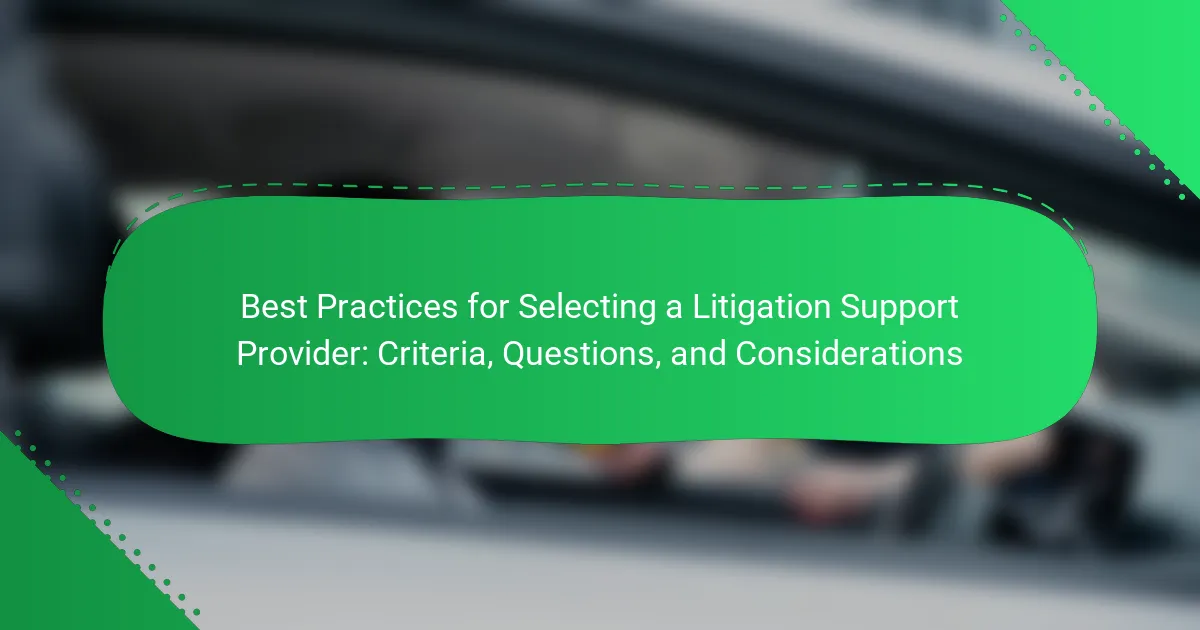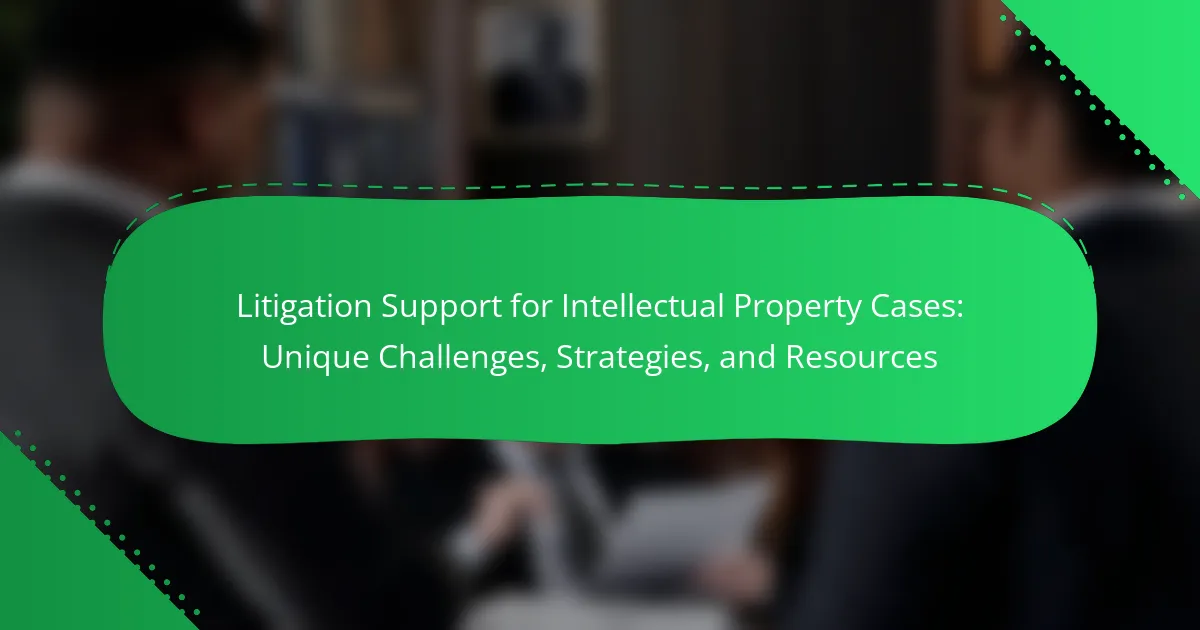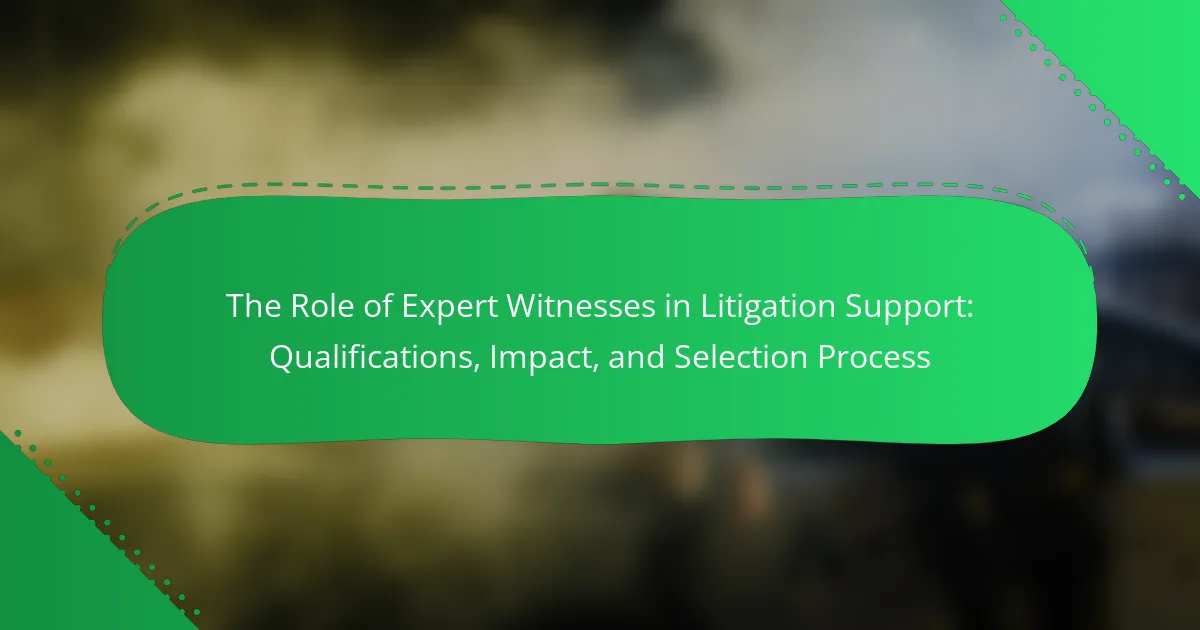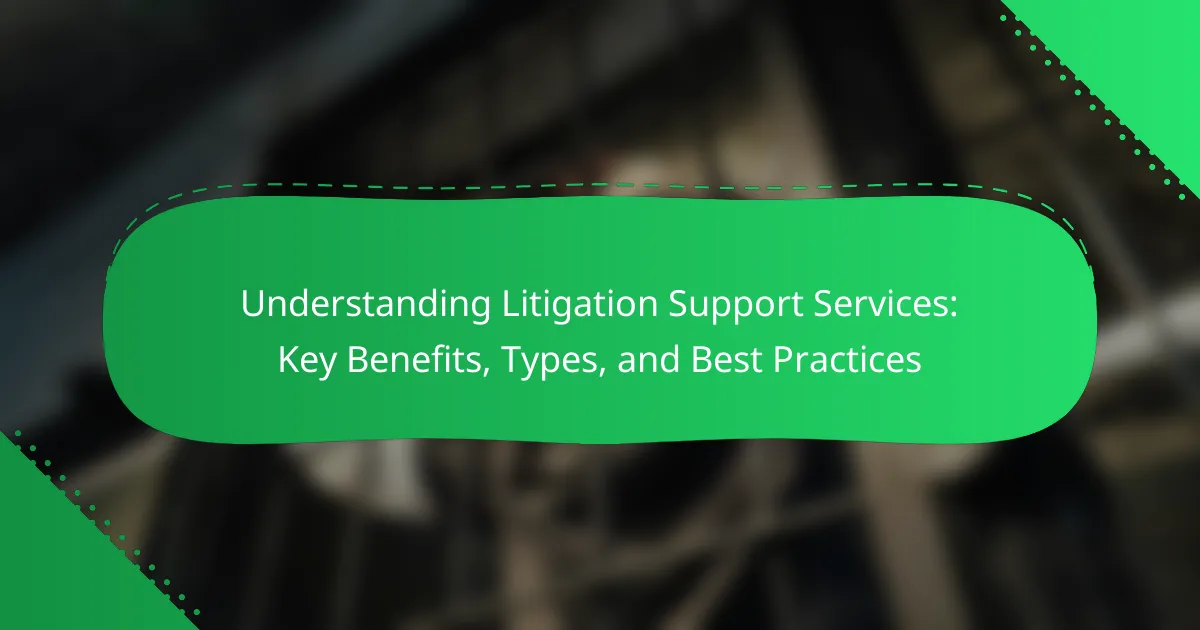Selecting a litigation support provider is a critical decision for legal professionals seeking effective assistance in managing cases. Key criteria for evaluation include the provider’s expertise in specific legal areas, technological capabilities, and relevant experience with similar cases. It is essential to assess their range of services, such as document management and trial support, as well as their communication skills and responsiveness during initial interactions. Additionally, understanding their pricing structure is vital to ensure alignment with budgetary constraints. This article outlines best practices and considerations for making an informed choice in selecting a litigation support provider.
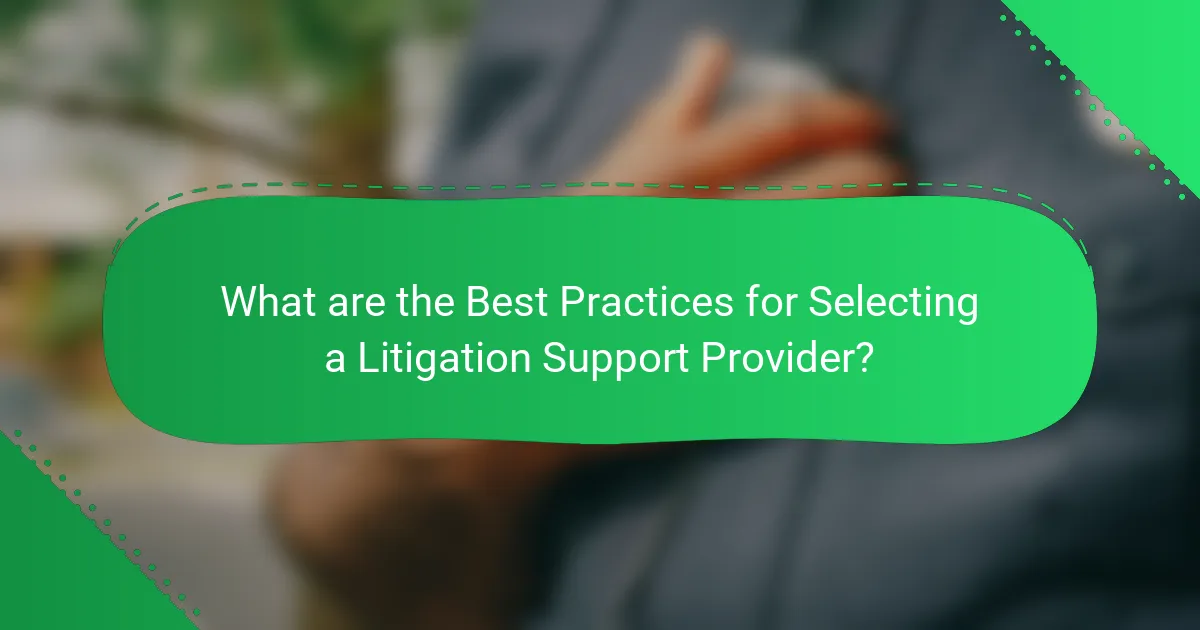
What are the Best Practices for Selecting a Litigation Support Provider?
The best practices for selecting a litigation support provider include evaluating their expertise, technology, and experience. Assess the provider’s knowledge in your specific legal area. Review their technology capabilities to ensure they meet your needs. Check their experience with similar cases or clients. Request references and case studies to validate their performance. Ensure they offer comprehensive services, including document management and trial support. Evaluate their responsiveness and communication skills during initial interactions. Lastly, consider their pricing structure and ensure it aligns with your budget. These criteria help ensure a suitable match for your litigation needs.
Why is it important to choose the right litigation support provider?
Choosing the right litigation support provider is crucial for the success of legal cases. A competent provider enhances case management efficiency and accuracy. They offer specialized expertise in handling complex legal data. This expertise can significantly impact the outcome of litigation. Effective support can lead to timely and well-organized presentations of evidence. Inaccurate or poorly managed data can result in costly delays or unfavorable judgments. Therefore, selecting the right provider directly influences the overall effectiveness of legal strategies.
What risks are associated with selecting an inadequate provider?
Selecting an inadequate provider poses several significant risks. These risks include compromised quality of service, which can lead to poor case outcomes. Inadequate providers may lack necessary expertise or experience. This can result in delays in project delivery or missed deadlines. Financial losses may occur due to inefficiencies or errors in the litigation process. Additionally, there is a risk of damaging the reputation of the firm that selects the provider. Inadequate support can also lead to increased stress and workload for the legal team. Ultimately, these factors can undermine the overall effectiveness of the legal strategy.
How can the right provider impact case outcomes?
The right provider can significantly impact case outcomes by ensuring quality support and expertise. A knowledgeable provider enhances the effectiveness of evidence presentation. They can streamline case management, reducing delays and errors. Access to advanced technology improves data analysis and visualization. Their experience can offer strategic insights that influence case strategy. A strong provider fosters effective communication among legal teams. Research shows that cases with skilled support often achieve better results. For instance, a study by the American Bar Association found that effective litigation support correlates with higher win rates.
What criteria should be considered when selecting a litigation support provider?
When selecting a litigation support provider, consider their experience and expertise in the specific area of law relevant to your case. Evaluate their technology and tools used for data management and analysis. Review their reputation and client testimonials to gauge reliability and effectiveness. Assess their responsiveness and communication skills during the selection process. Confirm their compliance with legal and ethical standards in handling sensitive information. Analyze their pricing structure to ensure it fits your budget while providing value. Finally, consider their ability to scale services based on the complexity and demands of your case.
What qualifications and experience should a litigation support provider have?
A litigation support provider should have relevant educational qualifications and practical experience in legal processes. Typically, a degree in law, paralegal studies, or a related field is essential. Experience in managing legal documents and understanding litigation procedures is crucial. Proficiency in e-discovery tools and software is also important. Familiarity with court rules and regulations enhances their effectiveness. Certifications, such as Certified Litigation Support Professional (CLSP), validate their expertise. Proven track records in previous litigation cases demonstrate their capability. Strong communication and analytical skills are necessary for effective collaboration with legal teams.
How do technology and tools influence provider selection?
Technology and tools significantly influence provider selection by enhancing efficiency and accessibility. Providers equipped with advanced technology can offer faster turnaround times for services. Tools such as case management software streamline communication and documentation processes. This leads to improved collaboration between clients and providers. Additionally, data analytics tools help evaluate provider performance based on past outcomes. The availability of online reviews and ratings allows clients to make informed decisions. A study by the International Association for Court Administration highlights that technology adoption correlates with higher client satisfaction. Overall, the integration of technology shapes the criteria used in selecting litigation support providers.
What questions should be asked during the selection process?
What questions should be asked during the selection process include inquiries about experience, expertise, and technology. Ask about the provider’s previous cases and outcomes to assess their track record. Inquire about their team qualifications and training in litigation support. Questions regarding the specific services offered can clarify their capabilities. It is essential to understand their technology and software used for case management. Additionally, ask about their data security measures to protect sensitive information. Understanding their pricing structure and any additional fees is crucial for budget considerations. Finally, inquire about their availability and responsiveness during critical phases of litigation. These questions ensure a thorough evaluation of potential providers.
What specific services do you require from a litigation support provider?
Litigation support providers typically offer services such as document management, e-discovery, and trial preparation. Document management includes organizing and reviewing large volumes of case-related documents. E-discovery involves the identification, collection, and analysis of electronically stored information. Trial preparation services encompass creating trial exhibits, managing evidence, and supporting attorneys during trial proceedings. Additional services may include legal research, witness preparation, and court reporting. These services are essential for efficient case management and to enhance the overall effectiveness of legal representation.
How can you assess the provider’s responsiveness and communication skills?
To assess a provider’s responsiveness and communication skills, evaluate their response time to inquiries. A quick reply indicates attentiveness and efficiency. Monitor the clarity of their communication. Clear and concise explanations demonstrate strong communication abilities. Additionally, observe their willingness to answer questions thoroughly. A provider who engages and provides detailed responses showcases good communication skills. Lastly, seek feedback from previous clients regarding their experiences. Positive testimonials often reflect a provider’s strong responsiveness and communication capabilities.
How can you evaluate the costs associated with litigation support services?
To evaluate the costs associated with litigation support services, start by identifying the specific services required. These services may include document management, electronic discovery, and trial support. Next, request detailed quotes from multiple providers to compare pricing structures. Review the scope of services included in each quote to ensure a fair comparison. Assess any additional fees that may arise, such as for overtime or specialized expertise. Additionally, consider the provider’s reputation and experience, as these factors can affect the overall value. Finally, analyze the potential return on investment by evaluating the impact of the services on case outcomes. This methodical approach ensures a comprehensive understanding of costs and helps in making an informed decision.
What pricing models are commonly used by litigation support providers?
Litigation support providers commonly use several pricing models. Hourly billing is one of the most prevalent models. This model charges clients based on the amount of time spent on their case. Flat fees are also frequently used for specific services, providing clients with predictable costs. Retainer agreements are another option, where clients pay an upfront fee for ongoing services. Some providers may offer contingency pricing, where fees are based on the outcome of the case. Additionally, subscription models are emerging, allowing clients to pay a regular fee for access to a suite of services. These models cater to various client needs and case complexities.
How do you determine the value of services offered by potential providers?
To determine the value of services offered by potential providers, evaluate their qualifications, experience, and client testimonials. Assess the range of services they provide and their alignment with your specific needs. Compare pricing structures to ensure they fit within your budget while considering the quality of service. Review case studies to understand their success rates and effectiveness in similar situations. Analyze their technology and tools to ensure they meet industry standards. Lastly, consider their responsiveness and customer support, as these factors contribute to overall service value.
What are the common considerations for different types of litigation support?
Common considerations for different types of litigation support include the specific needs of the case, the expertise of the support provider, and the technology used. Each case may require unique services such as document management, e-discovery, or trial support. Expertise in relevant legal areas is crucial for effective support. The provider’s familiarity with specific technologies can enhance efficiency and accuracy. Cost considerations also play a significant role in selecting litigation support. Timeliness in delivering services is essential for meeting deadlines. Understanding the scope of services offered helps in aligning with case requirements. Compliance with legal standards and confidentiality is paramount in all types of litigation support.
How does the nature of the case affect provider selection?
The nature of the case significantly influences provider selection in litigation support. Different cases require specific expertise and resources. For example, complex financial disputes may necessitate providers with strong forensic accounting skills. Conversely, intellectual property cases might require providers with technical knowledge in patent law. The size and scope of the case also dictate the level of support needed. Larger cases often demand providers with greater capacity and experience. Additionally, the urgency of the case can affect selection, as some providers may offer faster turnaround times. Overall, aligning the provider’s strengths with the case’s requirements ensures effective support and better outcomes.
What specialized services are available for complex litigation cases?
Specialized services available for complex litigation cases include expert witness consultation, case management, and document review. Expert witness consultation provides specialized knowledge to support legal arguments. Case management services help coordinate complex tasks and timelines effectively. Document review services ensure thorough analysis of relevant materials. Additionally, electronic discovery services assist in managing large volumes of digital evidence. These services are critical for navigating the intricacies of complex litigation.
How can you ensure a successful partnership with your chosen provider?
To ensure a successful partnership with your chosen provider, establish clear communication from the outset. Define roles and responsibilities to avoid misunderstandings. Set measurable goals and expectations to track progress effectively. Schedule regular check-ins to address any concerns promptly. Foster a collaborative environment to encourage innovation and problem-solving. Provide constructive feedback to enhance performance. Cultivate trust by being transparent about needs and challenges. These practices contribute to a productive and long-lasting partnership.
What steps should be taken to establish clear expectations and goals?
Establishing clear expectations and goals involves several key steps. First, identify the primary objectives of the litigation support process. Next, engage all stakeholders in discussions to gather their input and perspectives. Then, document specific, measurable, achievable, relevant, and time-bound (SMART) goals. Communicate these goals clearly to all parties involved. Regularly review and adjust the goals as necessary based on progress and feedback. Finally, ensure accountability by assigning responsibilities for each goal to specific individuals or teams. This structured approach fosters clarity and alignment among all stakeholders, enhancing the overall effectiveness of the litigation support efforts.
How can ongoing communication enhance the working relationship?
Ongoing communication can enhance the working relationship by fostering trust and transparency. Regular updates ensure that all parties are aligned on expectations and project goals. This clarity minimizes misunderstandings and reduces conflicts. Effective communication also encourages collaboration, allowing team members to share insights and expertise. Research shows that teams with strong communication practices are 25% more productive. Additionally, open dialogue enables prompt feedback, which can lead to continuous improvement in processes. Overall, consistent communication strengthens connections and drives successful outcomes in collaborative environments.
What are the best practices for maintaining a long-term relationship with a litigation support provider?
Establishing clear communication is essential for maintaining a long-term relationship with a litigation support provider. Regularly scheduled meetings help ensure both parties are aligned on expectations. Providing timely feedback fosters a collaborative environment. Setting mutual goals strengthens the partnership and enhances service delivery. Trust is built through transparency in processes and decision-making. Investing in training for both teams improves efficiency and understanding. Reviewing performance metrics periodically allows for adjustments and improvements. Lastly, recognizing and celebrating successes reinforces the partnership and commitment to shared objectives.
How can feedback and performance reviews improve service quality?
Feedback and performance reviews can significantly improve service quality by identifying areas for enhancement. They provide insights into employee strengths and weaknesses. This information allows organizations to tailor training and development programs effectively. Regular feedback fosters a culture of continuous improvement. It encourages employees to engage with their work and strive for excellence. Studies show that companies with effective feedback mechanisms see a 14.9% increase in productivity. This increase directly correlates with enhanced service quality. Performance reviews also align employee goals with organizational objectives. This alignment ensures that everyone is working towards the same standards of service excellence.
What strategies can help foster collaboration between legal teams and providers?
Establishing clear communication channels fosters collaboration between legal teams and providers. Regular meetings ensure all parties are aligned on goals and expectations. Utilizing collaborative technology enhances information sharing and accessibility. Setting mutual objectives encourages teamwork and accountability. Providing training on legal processes for providers enhances understanding and efficiency. Creating feedback loops allows for continuous improvement in collaboration. Documenting agreements and processes clarifies roles and responsibilities. These strategies improve the overall partnership and effectiveness in litigation support.
What final tips can help in selecting the right litigation support provider?
Identify the specific needs of your case before selecting a litigation support provider. Assess the provider’s expertise in your area of law. Verify their technology capabilities and ensure they align with your requirements. Check for client testimonials and case studies that demonstrate their success. Evaluate their responsiveness and communication skills during initial interactions. Confirm their compliance with relevant regulations and data security standards. Compare pricing structures and ensure transparency in costs. Finally, consider the provider’s ability to scale services as your case evolves.
The main entity of the article is litigation support providers. The article outlines best practices for selecting a litigation support provider, focusing on criteria such as expertise, technology, experience, and communication skills. It discusses the importance of choosing the right provider for case outcomes, the risks associated with inadequate support, and the specific services required. Additionally, it highlights the evaluation of costs, pricing models, and strategies for maintaining a successful partnership, providing essential questions to consider during the selection process.
